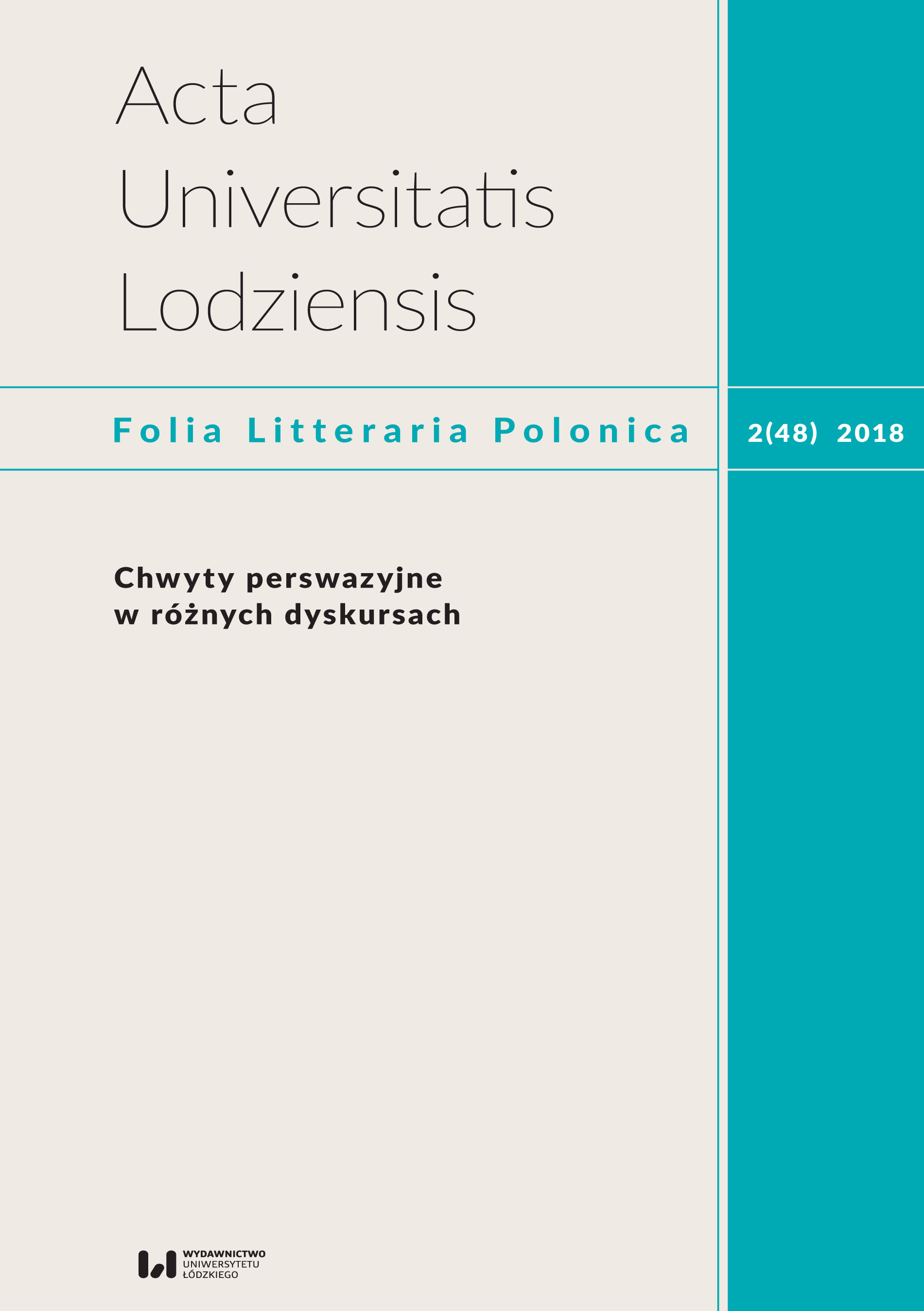Aktywacja standardów osobistych odbiorcy jako ograniczenie dla występowania efektu perswazyjnego komunikatu (na przykładzie message-matching effect)
DOI:
https://doi.org/10.18778/1505-9057.48.11Słowa kluczowe:
komunikacja perswazyjna, perswazyjny efekt dopasowania celu i argumentacji, standardy osobiste w komunikacji perswazyjnejAbstrakt
Artykuł przedstawia wyniki serii badań eksperymentalnych nad wpływem aktywacji standardów osobistych odbiorcy na perswazyjność efektu komunikacyjnego, opartego na dopasowaniu regulacyjnym celu komunikatu i argumentacji w nim zawartej. Uzyskane w warunkach polskich wyniki wydają się stawiać pod znakiem zapytania przyjęte w tzw. value experience Edwarda Tory Higginsa założenie odrębności standardów osobistych i społecznych oraz zgodności regulacyjnej jako czynników równolegle warunkujących siłę zaangażowania człowieka w działanie. Efekt zgodności regulacyjnej wydaje się być bowiem przez powyższe moderowany.
Pobrania
Bibliografia
Bąk W., Teoria ukierunkowań regulacyjnych E. Tory Higginsa, „Roczniki Psychologiczne” 2008, t. 9, nr 1, s. 7–38.
Google Scholar
Cesario J.F., Grant H., Higgins E.T., Regulatory Fit and Persuation: Transfer from „Feeling Right”, „Journal of Personality and Social Psychology” 2004, vol. 86, s. 388–404.
Google Scholar
Cesario J.F., Higgins E.T., Scholer A.A., Regulatory Fit and Persuation: Basic Principles and Remaining Questions, „Social and Personality Psychological Compass” 2008, vol. 2(1), s. 444–463.
Google Scholar
Doliński D., Techniki wpływu społecznego, Warszawa 2011.
Google Scholar
Doliński D., Drogosz M., Czy obywatele poszliby głosować przeciw? Regulacyjne nastawienie na promocję vs prewencję a aktywność wyborcza, „Kolokwia Psychologiczne” 2007, nr 16, s. 103–116.
Google Scholar
Freitas A.L., Higgins E.T., Enjoying Goal-Direction Action: The Role of Regulatory Fit, „Psychological Science” 2002, vol. 13, s. 1–6.
Google Scholar
Higgins E.T., Accesability Theory, [w:] Handbook of Theories of Social Psychology, red. P.A.M. Van Lange, A.W. Kruglanski, E.T. Higgins, New York 2012, s. 75–96.
Google Scholar
Higgins E.T., Beyond Pleasure and Pain. How Motivation Works, Oxford 2011.
Google Scholar
Higgins E.T., Making a Good Decision: Value from Fit, „American Psychologist” 2000, vol. 55, s. 1217–1230.
Google Scholar
Higgins E.T., Regulatory Fit Focus, [w:] Handbook of Theories of Social Psychology, red. P.A.M. Van Lange, A.W. Kruglanski, E.T. Higgins, New York 2012, s. 483–504.
Google Scholar
Higgins E.T., Value from Hedonic Experience and Engagement, „Psychological Review” 2006, vol. 113, s. 439–460.
Google Scholar
Kofta M., Doliński D., Poznawcze podejście do osobowości, [w:] Psychologia. Podręcznik akademicki, red. J. Strelau, t. 2, Gdańsk 2000, s. 561–600.
Google Scholar
Lee A.Y., Aaker J. L., Bringing the Frome into Focus: The Influence of Regulatory Fit on Processing Fluency and Persuation, „Journal of Personality and Social Psychology” 2004, vol. 86, s. 205–218.
Google Scholar
Lockwood P., Jordan C.H., Kunda Z., Motivation by Positive or Negative Role Models: Regulatory Focus Determines Who Will Best Inspire Us, „Journal of Personality and Social Psychology” 2002, vol. 83, s. 854–864.
Google Scholar
Oleś P.K., Wprowadzenie do psychologii osobowości, Warszawa 2003.
Google Scholar
Pervin L.A., Psychologia osobowości, przeł. M. Orski, Gdańsk 2002.
Google Scholar
Pfattheicher S, Sassenrath C.A., Regulatory Focus Perspective on Eating Behavior: How Prevention and Promotion Focus Relates to Emotional, External, and Restrained Eating, „Frontiers Psychology” 2014, s. 1–8.
Google Scholar
Semin G.R., Higgins T., de Montes L.G., Estourget Y., Valencia J.F., Linguistic Signatures of Regulatory Focus: How Abstraction Fits Promotion More than Prevention, „Journal of Personality and Social Psychology” 2005, vol. 89, s. 36–45.
Google Scholar
Spiegel S., Grant-Pillow H., Higgins E.T., How Regulatory Fit Enhances Motivational Strenght During Goal Pursuit, „European Journal of Social Psychology” 2004, vol. 34, s. 39–54.
Google Scholar
Wojciszke B., Psychologia społeczna, Warszawa 2011.
Google Scholar
Pobrania
Opublikowane
Jak cytować
Numer
Dział
Licencja
Prawa autorskie (c) 2018 © Copyright by Authors, Łódź 2017; © Copyright for this edition by Uniwersytet Łódzki, Łódź 2017

Utwór dostępny jest na licencji Creative Commons Uznanie autorstwa – Użycie niekomercyjne – Bez utworów zależnych 4.0 Międzynarodowe.











